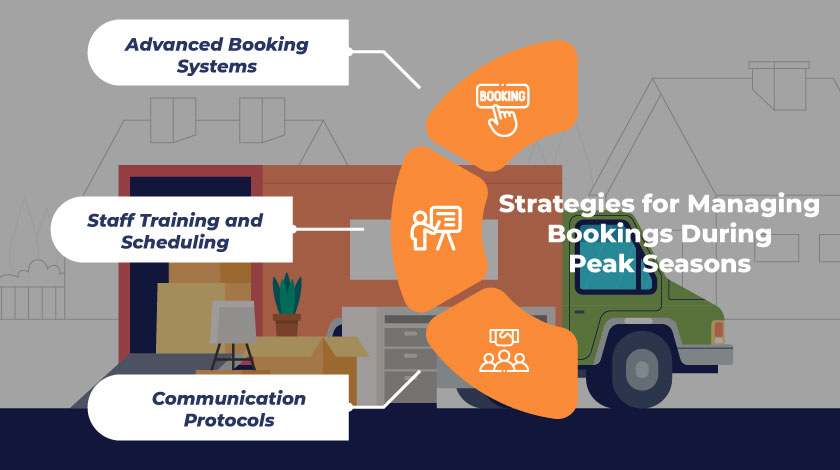Maximize Efficiency During Peak Moving Times

Every year, as the calendar approaches summer or the end of the month, moving companies brace for a significant uptick in demand. These peak periods can stretch operational capacities to their limits and put a company's reputation on the line.
In this blog, we'll explore three fundamental areas crucial to mastering the high-demand season: managing bookings, ensuring quality service, and maintaining customer satisfaction. Each section will provide practical strategies and tips to not only survive but also excel during these busy times. Whether you're a seasoned business owner in the moving industry or looking to refine your operational strategies, this guide will equip you with the tools and insights needed to navigate these challenging periods effectively.
Understanding High-Demand Moving Seasons

In the moving industry, there are times when demand for services spikes, particularly during the summer and at the end of each month. Summer is a popular time for families to move because it fits well with the school calendar, allowing kids to settle into a new home before the new school year starts. Also, the weather is usually better for moving. The end of the month sees a rush too, as this is when many leases end and people are looking to move into new homes.
Challenges Faced by Moving Companies During Peak Seasons
- Increased Booking Volume: There's a big jump in how many people want to move during these high-demand seasons. This can overwhelm moving companies, making it hard to keep up with all the requests for moving dates and times.
- Logistical Complexities: With so many moves happening, organizing everything becomes more complicated. It's like a big puzzle where you have to match trucks and moving teams with different schedules and locations. There’s also a greater risk of overbooking, which can lead to unhappy customers.
- Heightened Customer Expectations: People moving during these busy times often expect things to go very smoothly. They’re already stressed about moving, so any delays or problems can make them even more frustrated. They want fast, reliable service more than ever.
Strategies for Managing Bookings During Peak Seasons

Effectively managing bookings during busy seasons is crucial for smooth operations and customer satisfaction. Here are some straightforward strategies to help:
- Advanced Booking Systems: Invest in a robust booking system that can handle increased demand and provide accurate, real-time scheduling. This will help prevent overbooking and make the booking process smoother for both customers and staff.
- Staff Training and Scheduling: Train your staff to handle the busier periods effectively. Make sure they are familiar with your booking system and customer service practices. Strategically schedule enough staff during peak times to ensure you can handle the extra workload without delays.
- Communication Protocols: Keep your customers informed at every step. Use automated emails, SMS updates, and direct calls to update them about their booking status and any changes. Clear communication reduces customer stress and builds trust.
Also read: Importance of Tech-Driven Transformation
Ensuring Quality Service During Peak Times
Maintaining excellent service during busy seasons is crucial. Here's how you can ensure your service quality stays top-notch:
- Quality Control Measures: Set up regular checks for all equipment and carry out random quality checks on services. Implement a system for collecting and acting on customer feedback quickly, which helps in making immediate improvements.
- Resource Management: Plan your resource use wisely. Make sure you have enough trucks and moving equipment for the increased demand. Consider renting additional resources if needed and use tools to track resource availability in real-time.
- Team Efficiency: Keep your team motivated and efficient. Offer incentives for excellent performance and ensure fair work distribution to avoid burnout. Regular training and open communication are also important to keep your team sharp and responsive.
Maintaining Customer Satisfaction

Ensuring customer satisfaction is vital, especially during peak seasons when stress and expectations are high. Here are strategies to keep your customers happy and address any issues efficiently:
- Proactive Customer Service: Communication is key to proactive customer service. Keep your customers informed throughout the moving process—from initial booking to the final delivery. Anticipate common questions and concerns by providing FAQs and helpful information upfront. Use multiple communication channels like emails, SMS, and phone calls to ensure messages are received and understood.
Also read: Effective Ways to Excel Customer Communication
- Handling Complaints: When complaints arise, address them swiftly and effectively. Listen carefully to the customer’s issue, acknowledge their feelings, and take responsibility where appropriate. Offer practical solutions and, if possible, provide something extra to make up for their inconvenience. Turning a negative experience into a positive one can transform an unhappy customer into a loyal advocate for your business.
Also read: Guide for Resolving Moving Conflicts with Grace
- Follow-up and Feedback: After the service is completed, reach out to customers to ask for their feedback. This can be done through surveys, direct calls, or emails. Gathering feedback not only shows customers that you value their opinion but also helps you identify areas for improvement.
Moving Forward: Mastering Peak Seasons for Business Success
To assist your moving company in successfully navigating peak demand seasons, we have covered several important tactics in this article. We spoke about how proactive customer service may boost customer happiness, the need of quality control procedures to keep service standards high, and the significance of strong booking systems to handle rising demand. We also spoke about how to handle complaints properly and how important it is to follow up and get feedback in order to improve constantly.
Implementing these strategies in your business practices can make a significant difference. By preparing for peak times, you can ensure smoother operations, reduced stress for both your team and your customers, and maintain a high level of service quality that sets you apart from competitors.
It is important to keep in mind that successfully managing busy times not only improves the efficiency of your company operations but also strengthens your reputation and consumer loyalty. Seize this chance to transform the difficulties of high-demand seasons into prospects for advancement and achievement. Let us progress with assurance and excellence, continuously improving every new high-demand season.